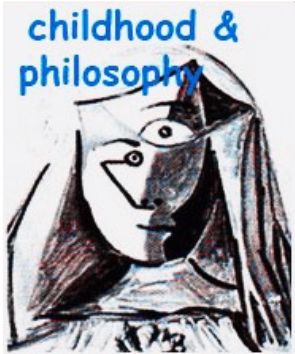schooling, community of philosophical inquiry and a new sensibility
DOI:
https://doi.org/10.12957/childphilo.2023.74061Keywords:
democracy studies, evolutionary psychology, philosophy of childhood, dialogical schooling, community of philosophical inquiryAbstract
This paper seeks to reconstruct the role of schooling in a moment of accelerated social, political, economic, geo-political, climatic, indeed planetary crisis. It identifies the school as a potentially prefigurative institution, an evolutionary social frontier, capable of nurturing the democratic social character, a form of sensibility apart from which authentic political democracy is not possible. As theorized by Herbert Marcuse and Richard Hart and Antonio Negri, the “new sensibility” or “multitude” is characterized by greater psychological freedom, individuality, social creativity and self-rule, comprising a “whole of singularities” that “acts in common”. It suggests a human subject with a vital, biological drive for liberation, with a consciousness capable of breaking through the material as well as ideological veil of a society based on hierarchy and domination, and is associated politically with democracy and social-anarchism, or what Murray Bookchin called “communalism”. This paper identifies three main characteristics of an institution informed by this form of modal subjectivity, all of them based on student-teacher dialogue: an emergent, project-based curriculum, whole-school direct democratic governance on all levels of the community, and the regular practice of communal philosophical inquiry, through which we problematize the concepts we live by, in the interest of their ongoing reconstruction.
Downloads
References
Bookchin, M. (2005). The Ecology of Freedom. Oakland CA: AK Press.
Bowen, J. (1970). A History of Western Education. The Ancient World: Orient and Mediterranean (Vol. 1). London: Methuen.
Corrington, R. S. (1992). Signs of Community. In Nature and Spirit: An Essay on Ecstatic Naturalism (pp. 83-119). New York: Fordham University Press.
Deleuze, G., & Guattari, F. (1987). A Thousand Plateaus: Capitalism and Schizophrenia. Translated by B. Massumi. Minneapolis: University of Minnesota Press.
deMause, L. (ed.). (1974). The History of Childhood. New York: Harper & Row.
Dewey, J. (1916). Democracy and Education. New York: Macmillan.
Dewey, J. (1922). Human Nature and Conduct: An Introduction to Social Psychology. New York: Henry Holt & C.
Fielding, M., & Moss, P. (2011). Radical Education and the Common School: A Democratic Alternative. London: Routledge.
Freire, P. (1965). Pedagogy of the Oppressed. New York: Continuum.
Graeber, D. (2004). Fragments of an Anarchist Anthropology. Chicago: Prickly Paradigm Press.
Hardt, M., & Negri (2004). Multitude: War and Democracy in the Age of Empire. New York: Penguin Books.
Krätzä. (2006). Democratic Schools. [VIDEO] https://www.youtube.com/watch?v=PfMk-cpXAP8&ab_channel=KR%C3%84TZ%C3%84
Malaguzzi, L. (1994). Your Image of the Child: Where Teaching Begins. Exchange 3. (March/April) http://exchangepress.com/article/your-image-of-the-child-where-teaching-begins/5009652/
Marcuse, H. (1969). An Essay on Liberation. Boston: Beacon Press.
Masschelein, J., & Simons, M. (2013). In Defense of the School: A Public Issue. Translated by J. McMartin. Leuven: Culture & Society Publishers.
Pearce, J. C. (2002). The Biology of Transcendence: A Blueprint of the Human Spirit. Rochester VT: Park Street Press.
Peirce, C. S. (1893). Evolutionary Love. The Monist. 3, 176-200.
Plato. (1961). Republic. Translated by P. Shorey. In The Collected Dialogues of Plato (pp. 575-844). Edited by E. Hamilton and C. Huntington. Princeton NJ: Princeton University Press.
Sorin, R. (2005). Changing Images Of Childhood: Reconceptualising Early Childhood Practice. International Journal of Transitions in Childhood 1(1), 12-21.



